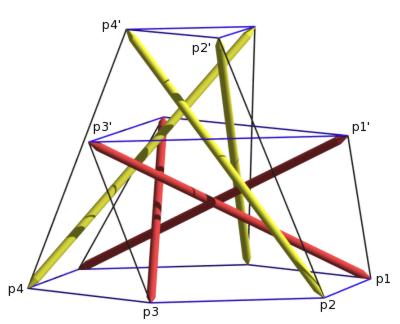
Split-Level Prism with Equal-Length Struts with Point Labels
structure file: tprism/x6prism6b.rc
variable file: tprism/x6prism6b.dat
digit list: src/mm.dls
|
Member Descriptions
[name, end point names, weight (if in objective function),
second power of length (if a constraint), member category,
Obj/Con/Exc (put in objective function, use as a constraint or
exclude from computations), flags]
For assembly purposes, only the name and end point names are
of interest. The other information may be of interest after
A Practical Guide to Tensegrity Design has been consulted.
# strut
<Member> struta p3' p1 -1.0 sqr(2.0) 1 Con *
<Member> strutb p4' p2 -1.0 sqr(2.0) 9 Con *
# interlayer tendon
<Member> xlta p1' p1 1.0 sqr(2.0) 3 Obj *
<Member> xltb p2' p2 2.0 1.0 3 Obj *
# end tendons
<Member> enda p2 p1 1.0 1.0 2 Con *
<Member> endb p3 p2 1.0 1.0 2 Con *
<Member> enda' p3' p1' 1.0 sqr(1.50) 4 Con *
<Member> endb' p4' p2' 1.0 sqr(0.75) 4 Con *
In-Situ Member Lengths
These are the lengths of the members when they are in place
and prestress is applied. The strut lengths are from screw-eye
center to screw-eye center, as are the tendon lengths.
The values are in model units.
struta: 2 strutb: 2 xlta: 1
xltb: 1.58114 enda: 1 endb: 1
enda': 1.5 endb': 0.75
Relative Member Force Magnitudes
These values are useful for developing an assembly
strategy for the structure. The tighter tendons are much
easier to tie in place early on, while the looser tendons
can be left to the last. This information is also used
to adjust tendon lengths since the measured length of a tendon
will be shorter for a highly-stressed tendon with the same
in-situ length as a tendon which is not so stressed.
struta: -2 strutb: -4 xlta: 1
xltb: 3.16228 enda: 1.5 endb: 1.5
enda': 1 endb': 2
Average tendon force magnitude: 1.69371
Construction Lengths (in millimeters and halves)
The construction length of a tendon is less than the in-situ
length since when the tendon is measured off it isn't under
any prestress force. The construction length for the strut
represents the length of the 3/8-inch-diameter wooden dowel.
The tendons were made of 25-lb.-test braided nylon fishing line.
In this case, the attachment point at the hubs was screw eye
at the end of the strut. The size of the eye varied slightly
from eye to eye, so I didn't do any member-length adjustments
here since my model isn't of sufficient complexity to take this
situation into account. I will adjust the lengths to take into
account the screw eye diameters when I do the actual assembly.
So the strut and tendon lengths given here are measured from
screw-eye center to screw-eye center. Prestress forces are
assumed not to affect strut lengths.
Elongation of Tendon of Unit Cross Section
Under Force of Average Magnitude (fraction)> .02
Length Scale Factor> 241/2
Strut and Tendon Hub Adjustments - s;t> 0 0
struta: 241 0 strutb: 241 0 xlta: 119 0 xltb: 183 1
enda: 118 1 endb: 118 1 enda': 178 1 endb': 88 1

Split-Level Prism with Equal-Length Struts with Point Labels
structure file: tprism/x6prism6b.rc
variable file: tprism/x6prism6b.dat
digit list: src/mm.dls
|
|
CONTACT: Bob Burkhardt Tensegrity Solutions Box 426164 Cambridge, MA 02142-0021 USA e-mail: bobwb@juno.com |